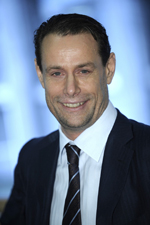 |
| Herve Gisserot |
GlaxoSmithKline ($GSK) did some unexpected housecleaning last year in China, some of it voluntary, some of it not so much. When the authorities started detaining local managers and employees on suspicion of conducting a $493 million bribery scheme, the company didn't have a choice.
After some internal digging, Glaxo remanded its China chief, Mark Reilly, back to headquarters. It dispatched Herve Gisserot to Shanghai to run the domestic unit in Reilly's place.
Now, there's more. According to Reuters sources, Glaxo has brought in two new sales and marketing managers to take the China office in hand. Gisserot added Thomas Willemsen, a German, to oversee the sales force, and Wang Yizhe, a Chinese citizen educated in the U.S., to handle marketing. The management changes follow the dismissal of an unspecified number of staffers; reports have said that about 150 people were shown the door, while hundreds more faced disciplinary action.
A Glaxo spokesman wouldn't provide much detail for Reuters on the new managers. "As we have made consistently clear we are committed to China and to serving the needs of patients," he told the news service. "The new management team in the country are shaping our business to best meet that purpose."
Bringing outsiders in to directly oversee sales and marketing could give Glaxo more control over the goings-on in its China unit. As the bribery scandal mounted last year, HQ disclaimed knowledge of the alleged corruption, but acknowledged that some local managers and employees "breached" corruption rules. If that's true, then the China unit basically went rogue--and Glaxo understandably wants to keep that from happening again.
The new China managers have a big job ahead; they'll need to rebuild trust with the government and physicians, many of whom have refused to see Glaxo reps. And they'll have to keep a close eye on employee expense accounts, which are subject to new rules handed down from the top brass.
Meanwhile, like their counterparts around the world, the China managers will be tasked with implementing Glaxo's new approach to sales and marketing. No quotas, no speaking fees for doctors, no incentive pay tied to script numbers. The changes will be phased in, and require plenty of training along the way. It will be an uphill climb; industry experts say bribery in the country is common. It would help if headquarters sets local revenue targets carefully. Aggressive goals may have incentivized the previous management's bad behavior.
And the internal investigations continue. As Reuters notes, Glaxo appointed a law firm to conduct its own probe, which is ongoing. And Chinese authorities are still in the midst of an industry-wide corruption investigation.
Our question is whether GSK plans similar housecleaning in the Middle East and Eastern Europe, where a series of bribery allegations has surfaced over the last several weeks. The company is digging into accusations in Poland and 9 Middle Eastern countries, including Iraq, Jordan and Lebanon.
Meanwhile, some employees who haven't been dismissed did suffer financially. The company has said it pulled bonus pay from some staffers whose behavior wasn't quite pristine. And CEO Andrew Witty paid his own price: The company's board cut back his incentive pay because of the China scandal.
- see the Reuters story
Special Reports: Top 10 drugmakers in emerging markets - GSK | Top 10 pharma companies by 2013 revenue - GSK